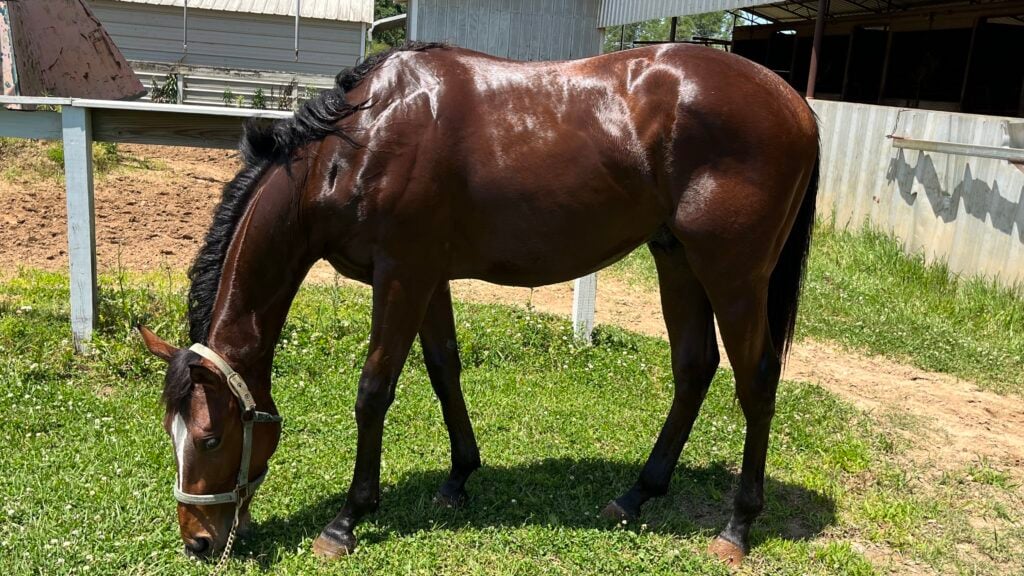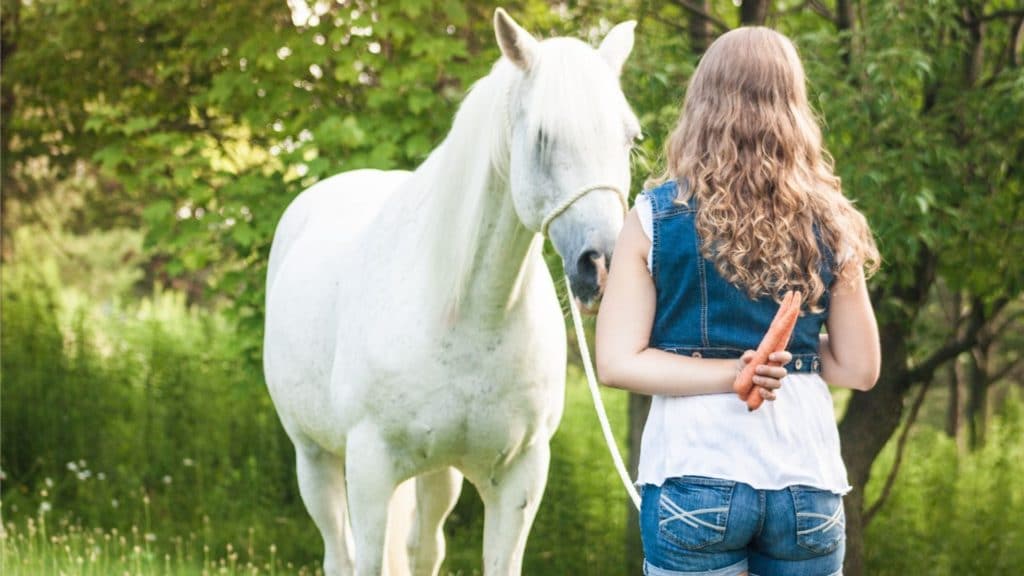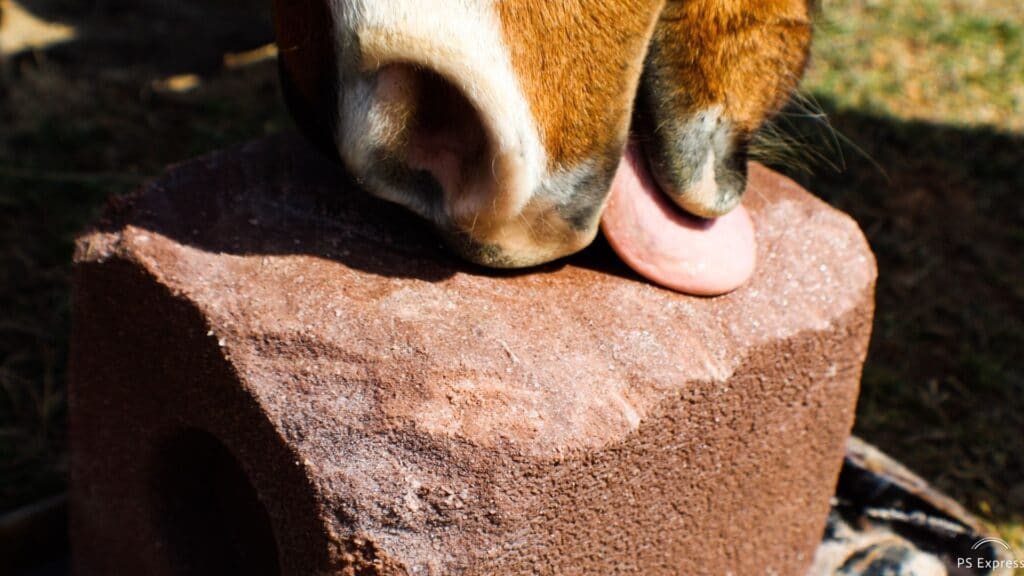Last updated: June 9, 2025
Did you know that the digestive system of a horse is uniquely designed to process a variety of foods, yet it’s incredibly sensitive? As a horse owner with six racing Thoroughbreds under my care, I’ve dove deep into the question, “What does a horse eat?”
A well-balanced diet is not just a necessity; it’s the foundation of their well-being and success on the track. Learning the critical role nutrition plays in their health and performance has been enlightening. Let’s explore the key components of what horses eat and its impact on their health.

Hay: Essential Nutrition for Horses
Hay is a cornerstone of a horse’s diet, providing the necessary fiber for digestive health and energy. Let’s explore the different types of hay and their unique benefits, along with practical feeding guidelines to ensure your horse thrives.
Types and Benefits
- Timothy Hay: Ideal for everyday feeding; low in protein, high in fiber, supporting digestive health.
- Alfalfa Hay: Rich in protein, minerals, and vitamins; perfect for active, working horses or those needing extra nutrition. Read more about Alfalfa Hay.
- Orchard Grass: A tasty alternative to Timothy, with similar nutritional value; suitable for horses at all activity levels.
- Mixed Hay: Combines various grasses, offering a balanced diet with diverse nutrients.
Feeding Guidelines
- General Rule: Horses should consume about 1-2% of their body weight in hay daily. For a 1000-pound horse, that’s 10-20 pounds of hay.
- Monitor Weight: Adjust hay amounts based on your horse’s activity level, health, and weight goals.
- Consistency: Feed at the same times daily to maintain a stable digestive process.
- Quality Check: Ensure hay is clean, dry, and free from mold or dust, which can cause respiratory issues.
Remember, the right type of hay can significantly impact your horse’s health, energy, and overall well-being. Always choose high-quality hay and adjust portions to meet your horse’s specific needs.

Grass: A Natural Source of Nutrition
Grass is fundamental to a horse’s diet, offering essential nutrients and promoting healthy digestion through natural grazing behavior.
Importance of Grazing
- Grazing fulfills a horse’s instinctual need to forage, supporting both physical health and mental well-being. It encourages movement, aids in digestion, and provides a slow, steady intake of fiber. Read more about why horses need to eat so often.
Preferred Grass Types
- Kentucky Bluegrass: Highly palatable, it thrives in various climates, making it a favorite among horse owners.
- Bermuda Grass: Ideal for warmer climates, offering high fiber content that’s excellent for digestion.
- Timothy Grass: Well-loved for its ease of digestion and suitability for horses at all life stages.
- Orchard Grass: Offers a good balance of nutrients and is often mixed with legumes for a richer diet.
I incorporate some of these grass types into my horse’s grazing routine. I’ve found it significantly contributes to their health and happiness.

Grains: Concentrated Energy for Horses
Grains are a valuable energy source for horses, supplementing their forage-based diet with essential nutrients and calories.
Common Grains and Nutritional Value
- Oats: Rich in fiber and easily digestible, making them a safe choice for most horses. They provide energy without the risk of digestive upset.
- Barley: Higher in energy than oats but needs to be processed (crimped or cooked) for better digestibility.
- Corn: High in calories and energy, best fed cracked for easier digestion. Use cautiously due to its high starch content.
- Wheat Bran: Often used as a supplement for its phosphorus content, but it should be balanced with calcium-rich foods to prevent mineral imbalances.
I often supplement my performance horse’s diet with cooked oats.
Safe Feeding Practices
- Gradual Introduction: Any changes to a horse’s grain intake should be introduced slowly over several days to prevent digestive issues. A quick change in diet can cause horses to colic.
- Moderation: Grains should complement, not replace, forage in a horse’s diet. Overfeeding grains can lead to weight gain and metabolic disorders.
- Consistency: Feed grains at the same times each day to maintain a stable digestive rhythm.
- Quality Check: Ensure grains are fresh, free from mold, and stored properly to avoid contamination.
By understanding the nutritional value of common grains and adhering to safe feeding practices, you can effectively incorporate grains into your horse’s diet for additional energy and health benefits.

Concentrate Mixes: Boosting Equine Diets
Concentrate mixes are formulated feeds designed to supplement a horse’s forage diet, providing a balanced blend of grains, vitamins, and minerals.
Purpose and Composition
Concentrate mixes serve to ensure that horses receive all the necessary nutrients that forage alone might not provide. These mixes typically include a combination of grains like oats, corn, and barley, along with added vitamins and minerals to target specific dietary needs. They’re tailored to support everything from a horse’s energy levels to their coat condition and overall health.
When to Use
- High Energy Needs: For horses with high workloads, such as racing Thoroughbreds or competition horses, concentrate mixes can provide the additional calories needed for optimal performance.
- Special Diets: Horses with specific health issues, such as those needing weight management or with metabolic disorders, can benefit from specially formulated concentrates.
- Life Stages: Young, growing horses, as well as senior horses, may require concentrate mixes to meet their developmental and maintenance needs.
All of our horses in training get two servings a day of a concentrated mix. Incorporating concentrate mixes into a horse’s diet should be done with consideration to their individual energy requirements, health status, and the nutritional quality of their forage.

Fruits and Vegetables: Healthy Treats for Horses
Fruits and vegetables can be a nutritious addition to a horse’s diet, offering vitamins, minerals, and hydration, along with a bit of variety.
Safe Options and Their Benefits
- Apples: Rich in fiber and vitamins, apples are a favorite treat for many horses. They can help support digestive health.
- Carrots: High in beta-carotene (which the body converts to Vitamin A), carrots are beneficial for vision, skin, and coat health.
- Bananas: Including the peel, bananas are a good source of potassium, essential for muscle function and overall health.
- Watermelon: Both the flesh and rind are safe, providing hydration and vitamins A and C.
Recommend Portions
- Treats, including fruits and vegetables, should not exceed 10% of a horse’s daily diet to avoid digestive upset and nutritional imbalances.
- A few slices of apple or carrot per day, or a small banana, are appropriate portions for most horses.
- Always introduce any new food slowly into their diet to monitor for any adverse reactions.
Remember, while fruits and vegetables are healthy treats, they should be given in moderation as part of a balanced diet. Always ensure that treats are cut into appropriate sizes to prevent choking hazards.

Other Essential Dietary Needs
Salt and Minerals
- Importance: Salt and essential minerals like calcium and phosphorus are crucial for maintaining a horse’s electrolyte balance and overall health.
- Sources and Supplementation: Salt blocks or loose salt can be provided for free-choice consumption, while mineral supplements can be added to feed based on specific dietary needs.
I always have mineral blocks available for my horses.
Water
- Critical Role: Water is vital for digestion, temperature regulation, and overall physiological functions.
- Guidelines: Ensure constant access to clean, fresh water. A horse can drink 5 to 10 gallons per day, more in hot weather or when exercising.
Supplements
- When Needed: Supplements may be necessary for horses with specific health issues, deficiencies in their diet, or increased nutritional demands.
- Common Supplements: These can include vitamin E for horses without access to fresh pasture, omega-3 fatty acids for anti-inflammatory benefits, and joint supplements for older horses or those with joint issues.

Foods to Avoid: Ensuring Your Horse’s Safety
While many foods are beneficial to your horse’s diet, certain items should be strictly avoided to prevent health issues. Here’s a list of common harmful foods and the risks they pose:
- Chocolate: Contains theobromine, which is toxic to horses and can lead to heart issues and nervous system dysfunction.
- Avocado: All parts of the avocado are toxic to horses, causing respiratory distress, congestion, and potentially heart failure.
- Lawn Clippings: Freshly cut grass can ferment in a horse’s stomach, leading to colic and laminitis. The rapid fermentation process increases the risk of gas and blockages.
- Caffeinated Beverages: Coffee, tea, and soda can cause irregular heart rhythms and nervous system disturbances.
- Onions and Garlic: In large quantities, these can destroy red blood cells, leading to anemia. While garlic is often used in small amounts for various health benefits, it should be administered carefully and under veterinary guidance.
- Potatoes and Tomatoes: Members of the nightshade family, these contain solanine, which can cause gastrointestinal distress and nervous system problems.
- Bread and Other Fermentable Foods: Can expand in the stomach, leading to discomfort, colic, and even rupture if consumed in large quantities.
Understanding what foods to avoid is as crucial as knowing what to feed your horse. Always err on the side of caution and consult with a veterinarian or equine nutritionist if you’re unsure about a particular food item.
FAQs on What Horses Eat
How much hay should I feed my horse daily?
Horses should consume about 1-2% of their body weight in hay daily. For a 1000-pound horse, this equates to 10-20 pounds of hay per day, adjusted based on their activity level, health, and weight management needs.
Can horses eat fruits and vegetables?
Yes, horses can eat fruits and vegetables as treats. Safe options include apples, carrots, and watermelon. These should be given in moderation, not exceeding 10% of their daily diet, to avoid digestive issues.
Are there any foods that are toxic to horses?
Yes, certain foods are toxic to horses, including chocolate, avocado, and anything from the nightshade family, such as potatoes and tomatoes. These can cause serious health issues and should be avoided.
How important is water in a horse’s diet?
Water is crucial and must be available at all times. Keep your horse hydrated, a horse can drink 5 to 10 gallons of water per day, with needs increasing with exercise and hot weather.
How can I ensure my horse is getting enough minerals?
Salt blocks or mineral supplements can be used to ensure your horse receives essential minerals. The specific needs can vary, so it’s best to consult with a veterinarian or equine nutritionist for personalized advice.
Conclusion: What Does a Horse Eat?
A horse’s diet is a delicate balance of hay, grass, grains, fruits, vegetables, and other essential dietary needs like salt, minerals, and water. Each component plays a crucial role in maintaining health, energy levels, and overall well-being.
While we’ve explored safe options and general guidelines, it’s important to remember that every horse is unique. Factors such as age, activity level, and health status can greatly influence nutritional requirements.
For a diet that truly meets your horse’s specific needs, consulting with an equine nutritionist is invaluable. These experts can provide personalized dietary plans that optimize health and performance, ensuring your horse thrives in every stage of life. Remember, the foundation of good health is a well-balanced diet, tailored to the individual horse.

About the Author: Miles Henry
Lifelong Horseman | Racehorse Owner | Published Author
Miles Henry brings over 25 years of hands-on experience training and owning Thoroughbred racehorses. Raised with Quarter Horses and Appaloosas, he’s spent a lifetime learning from horses—on the track, in the barn, and in the field. Today, he runs a small but successful racing stable in Louisiana and shares real-world insights on HorseRacingSense.com, helping horse owners, fans, and bettors navigate the sport with confidence.
📚 Books: View Miles’s books on Amazon »
🎧 Podcast Guest: Animal Tales Ep. 32 |
YouTube Interview
📩 Newsletter: Sign up for racing tips and horse care advice »
🔗 Follow Miles:
Twitter |
Facebook |
YouTube

